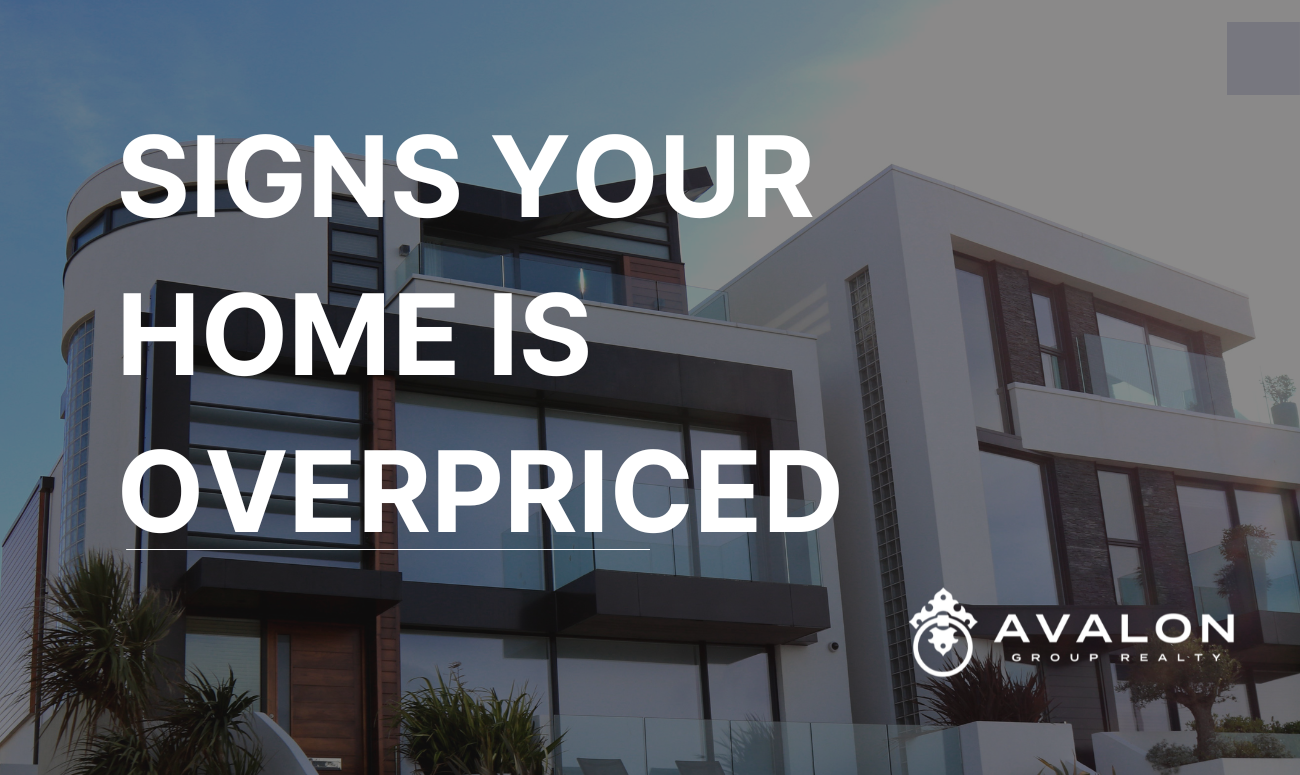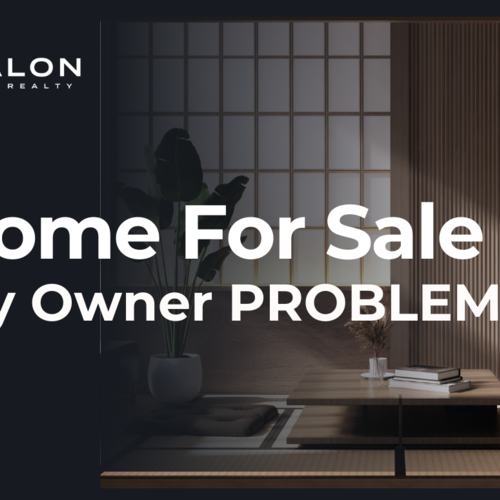Signs Your Home Is Overpriced: The Importance of Correctly Pricing Your Home
If you’re selling your home, you must understand that pricing your home correctly from the beginning is critical. The most common reason a home doesn’t sell is that it is overpriced. But how do you know if you have an overpriced house? There will be signs that will be screaming for you to notice. Without considering them, you’ll put yourself in a terrible spot.
Signs Your Home Is Overpriced: Why Correct Pricing Matters
Overpricing a home can create damaging effects, period. The probability is that if you price your home too high, in the beginning, you will likely end up with less money in your pocket, which is not the goal when selling a home. To sell for the most money, you mustn’t overprice it. It sounds counterintuitive that asking for more leads to less, but it’s true in many circumstances.
If you happen to make the mistake of overpricing your home, you must immediately identify this mistake and make a change immediately. How does a seller know if their home is overpriced? There are many telltale signs to know if your pricing does not meet market expectations. Keep reading, and you will find out how to know if a house is overpriced.
I
Signs Your Home Is Overpriced: Insights from Real Estate Experts
Aaron Hunt, a top FloridaRealtor with eleven years of experience and co-owner of Avalon Group Realty, says “there are very few things that will hurt the home selling process than overpricing.” Aaron, from being in the industry for so long, can immediately notice when homes don’t line up to the competition. Experienced Realtors immediately notice when properties aren’t comparable to other homes with similar prices.
Signs Your Home Is Overpriced: Noteworthy Facts and Statistics on Overpriced Housing
Accurate house pricing influences real estate sales immensely. Before delving into the signs of an overpriced home, let’s consider some noteworthy facts and statistics on overpriced housing:
- An overpriced property is a home listed significantly higher than its market value.
- Overpricing can occur due to various factors such as location, demand, and speculative market conditions.
- Overpriced houses often experience difficulty in finding buyers and may stay on the market for extended periods.
- Buyers should exercise caution when considering an overpriced house as it may not provide a good return on investment.
- Working with a knowledgeable real estate agent can help buyers identify and avoid overpriced houses.
- In the last year, there has been a 12% increase in overpriced properties.
- Studies show that 9 out of 10 homebuyers believe they have encountered an overpriced house at least once during their search.
- On average, overpriced homes stay on the market for 23% longer than homes priced appropriately.
- Overpricing a house by just 5% can decrease the chances of selling it by 42%.
- One of the top mistakes by home sellers is putting their house in a price range that doesn’t make sense.
Signs Your Home Is Overpriced: Eight Ways to Tell If Your Home is Overpriced
Let’s examine how to tell if a house is overpriced.
1. Signs Your Home Is Overpriced: Your Home Is Priced Much Higher Than Your Neighbors
Generally speaking, home values will be relatively consistent and close in most neighborhoods. One telltale sign that your home is overpriced is if your home is listed at $100,000 higher than similar homes for sale in your community.
While it’s not impossible that there can be homes with a $100,000 value difference, it is pretty rare. One of the most common methods that real estate agents will use to determine a home’s value is by completing a comparative market analysis.
2. Signs Your Home Is Overpriced: You’ve Had Very Few Or No Showings
Excitement is a widespread emotion that a seller experiences. Sellers are generally happy their home is listed for sale and being advertised all over the Internet. Weeks pass, and there have been a couple or, even worse, zero showings.
That excitement now turns to concern and frustration. If this sounds familiar, the likelihood that your home is overpriced is high.
3. Signs Your Home Is Overpriced: The Days on Market is Much Higher Than The Local Average
When homes are priced incorrectly, they sit on the market without any offers. The days on the market continue to grow. It is a terrible situation that continues to get worse over time.
Going above the average selling time for the local area should tell you something loud and clear. The market tells you when to reduce your price. It’s at this time you must listen to the market.
From being in the industry for many years, when the time on the market grows so does the spread between the listing and eventual sale price.
One of the first things a buyer will ask their agent is how long the property has been listed for sale. Properties with long market times are not in a position of strength.
4. Signs Your Home Is Overpriced: There Have Been No Offers Submitted
In most real estate markets, a homeowner should receive at least one offer within the first two to three weeks if a home is priced correctly. If you haven’t received an offer after a couple of months, this is a great way to know your home is most likely overpriced.
If your local real estate market is currently in the midst of a seller’s market, you should expect an offer on your home within the first couple of days on the market if it’s priced correctly.
Even in buyer’s markets, homes that are priced accurately receive interest. Some types of properties will take longer to receive an offer. For example, there may be fewer buyers when selling a luxury home.
5. Signs Your Home Is Overpriced: Your Home Is Priced Much Higher Than Your Neighbors
Generally speaking, home values in most neighborhoods tend to be relatively consistent. If your home is listed at a staggering $100,000 higher than similar homes for sale in your community, it’s a glaring sign that it might be overpriced. Real estate agents commonly use a Comparative Market Analysis (CMA) to determine a home’s value, and a significant deviation from the average could suggest overpricing.
Transitioning from a competitive market analysis to a strategic pricing approach is crucial. Ensure your real estate agent conducts a thorough analysis, comparing recent sales and current listings to accurately assess your home’s value within the market.
6. Signs Your Home Is Overpriced: You’ve Had Very Few Or No Showings
Excitement at the prospect of selling your home can quickly turn into concern and frustration if weeks pass without any showings. Furthermore, if you find yourself in a situation with minimal or zero showings, it’s a red flag that your home might be overpriced.
To address this, consider adjusting your pricing strategy promptly. Lowering the price can stimulate interest and attract potential buyers, ultimately leading to more showings. A proactive approach in adapting to the market’s response is crucial to avoid prolonged periods without any buyer interest.
7. Signs Your Home Is Overpriced: Yhe Days on Market is Much Higher Than The Local Average
Correctly priced homes typically garner attention and offers within a reasonable timeframe. However, if your property lingers on the market for an extended period, well beyond the local average, it’s a clear signal that potential buyers perceive it as overpriced.
Listening to the market is essential at this stage. If your days on market surpass the local average, consider a strategic price reduction. Aligning your asking price with market expectations can revitalize interest and expedite the selling process.
8. Signs Your Home Is Overpriced: There Have Been No Offers Submitted
In a healthy real estate market, homeowners usually receive at least one offer within the first two to three weeks if their home is appropriately priced. If months pass without any offers, it’s a strong indication that your home might be overpriced.
Evaluate the market conditions and be realistic about your home’s value. If the lack of offers persists, a price adjustment is necessary. This can rekindle interest among potential buyers, increasing the likelihood of receiving offers.
Signs Your Home Is Overpriced: Strategies to Correct Overpricing
1. Collaborate with Your Real Estate Agent
Communication is key when addressing an overpriced home. Engage in an open dialogue with your real estate agent, discussing market trends and buyer feedback. An experienced agent can provide valuable insights and guide you in making informed decisions regarding price adjustments.
2. Utilize Comparable Sales and Market Trends
Work closely with your real estate agent to leverage comparable sales and current market trends. A well-supported pricing strategy based on recent sales and the prevailing market conditions enhances the accuracy of your home’s valuation. This approach helps align your expectations with realistic market values.
3. Implement a Gradual Price Reduction
Rather than making drastic cuts, consider a gradual approach to price reduction. Incremental adjustments allow you to gauge market response while maintaining a competitive position. This strategy minimizes the risk of undervaluing your property while increasing the chances of attracting potential buyers.
4. Enhance Your Home’s Appeal
Incorporate strategic improvements to enhance your home’s appeal. Investing in minor upgrades, landscaping, or staging can make a substantial difference in how buyers perceive your property. By presenting your home in its best light, you may justify a higher asking price and capture buyer interest.
Signs Your Home Is Overpriced: The Role of Feedback and Red Flags in Recognizing Overpricing
Understanding the signs of an overpriced home extends beyond market trends and pricing strategies. One of the most significant benefits of hiring a top real estate agent is the invaluable feedback obtained from showings. Furthermore, feedback from other real estate agents and potential buyers plays a pivotal role in gauging the market’s perception of your property.
Signs Your Home Is Overpriced: The Importance of Feedback
Feedback is not just a courtesy; it’s a crucial tool for homeowners looking to sell their property effectively. It provides insights into aspects that may need improvement, allowing for timely adjustments. A top real estate agent facilitates this process, ensuring that you receive constructive feedback after every showing.
1. Corrective Measures Based on Feedback
Feedback allows homeowners to address specific concerns that potential buyers may have. For instance, if a prospective buyer mentions that the paint colors are too “bright,” it signals an opportunity to consider repainting the room. This proactive approach ensures that your home aligns better with the preferences of potential buyers.
2. Pricing Adjustments Based on Feedback
If feedback consistently indicates that your home is perceived as overpriced, it becomes a clear signal to consider adjusting the price. A skilled real estate agent will interpret this feedback and guide you through the necessary steps to align your asking price with market expectations.
Signs Your Home Is Overpriced: Red Flags Indicating Overpricing
1. You’ve Received Lowball Offers
While overpriced homes typically struggle to attract offers, receiving several offers significantly below the listing price is a red flag. These “lowball” offers are often an indication that potential buyers perceive the property as overpriced. If you find yourself consistently receiving offers much lower than your asking price, it’s a cue to reassess your pricing strategy.
2. St. Joseph Statue Superstition
Unusual practices, such as burying a St. Joseph statue, can be a red flag. This superstitious act is sometimes resorted to by sellers and agents when a home isn’t selling. However, it’s essential to recognize that superstitions won’t sell an overpriced house. If your agent suggests such practices, it might be time to question the overall strategy and pricing of your home.
3. Your Home Didn’t Sell & Expired
Perhaps the most evident sign of an overpriced home is when it fails to sell and becomes an expired listing. If your property doesn’t attract buyers and expires after six months, it’s crucial to acknowledge that the issue might be with the pricing strategy rather than the market itself. Instead of blaming external factors, a homeowner should introspect and consider adjusting the asking price.
Signs Your Home Is Overpriced: The Ultimate Importance of Correct Pricing in Real Estate
In the intricate puzzle of real estate, the number one reason a home sells is the right price. Determining the correct list price is pivotal to the success of the home-selling process. A correctly priced home sells relatively quickly, attracting motivated buyers. Conversely, overpricing can lead to extended periods on the market or, in extreme cases, a property not selling at all.
Signs Your Home Is Overpriced: Conclusion
Spotting an overpriced house is not a complex task. The signs are evident, and buyers can discern when a property is priced too high. As a seller, it’s essential to be attuned to market feedback, adjust pricing strategies accordingly, and work closely with a knowledgeable real estate agent to navigate the intricacies of the market. Remember, pricing your home correctly from the beginning is not just a strategic move; it’s the key to unlocking a successful and timely sale, ensuring you receive the most money possible in the shortest time.
If you are looking for a St Petersburg Realtor visit https://avalongrouptampabay.com/
If you want to look up home prices in your neighborhood visit https://avalongrouprealtyfl.com/




